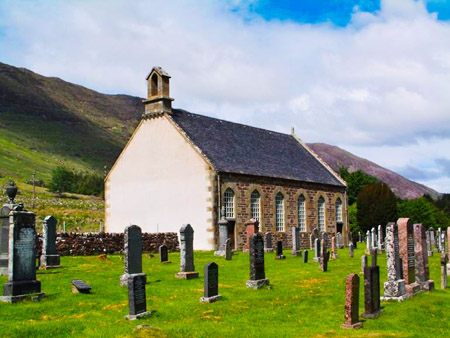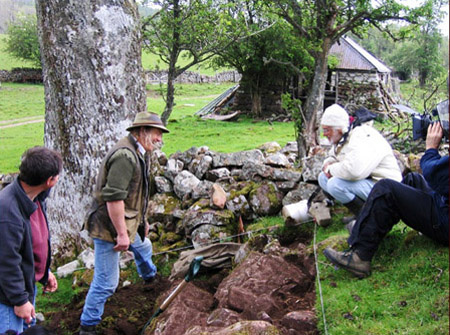
Applecross was, and still remains, one of the most remote areas of Scotland. Until the coast road was completed in 1975, the Peninsula was split north and south. Access to Applecross was either by the Bealach nam Bo (Pass of the Cattle) or by sea.

The only access to the, then, thriving crofting and fishing townships scattered along the west and north coasts was by footpath or by boat. By the time that the coast road was completed, it was too late for many. In 1850 nearly 3,000 people lived in the scattered townships of Applecross. Now there are less than 300. The clearances were responsible for some of the depopulation, but lack of local opportunities and work also contributed. The remains of previously thriving communities can be seen in many areas along the coast.
Being one of the earliest Christian settlements in Scotland, Applecross stands second only to Iona. In the year 673 ad the Irish Monk Maelrubha founded this Christian settlement on the land between the river and Beinn A'Chlachain. He declared the surrounding area a Sanctuary, and even today, Applecross is known as A'Chomraich - the Sanctuary.

For fifty nine years, Maelrubha established his monastery and, using Applecross as his base, spread the gospel from Applecross to Lochcarron and into Easter Ross. Unfortunately, nearly every trace of Maelrubha's settlement in Applecross has long disappeared. On the site of Maelrubha's settlement, now stands Clachan Church and graveyard where Maelrubha is reputed to be buried.

In 2005, the Channel 4 Time Team carried out an archaeological dig at Applecross campsite and confirmed that the ruins there were those of a broch. Brochs were erected mainly in the Highlands and Islands and their construction ended a millennium before the earliest mortared stone castles of mediaeval times appeared. Since 2005 several other digs have taken place and the site is now open to the public. The Time Team programme is available to view in the Applecross Heritage Centre.
